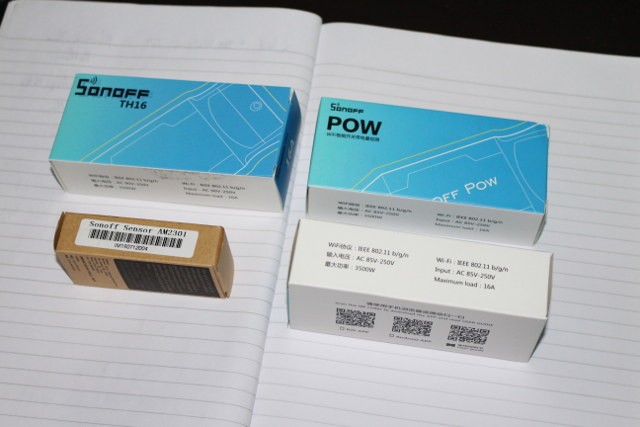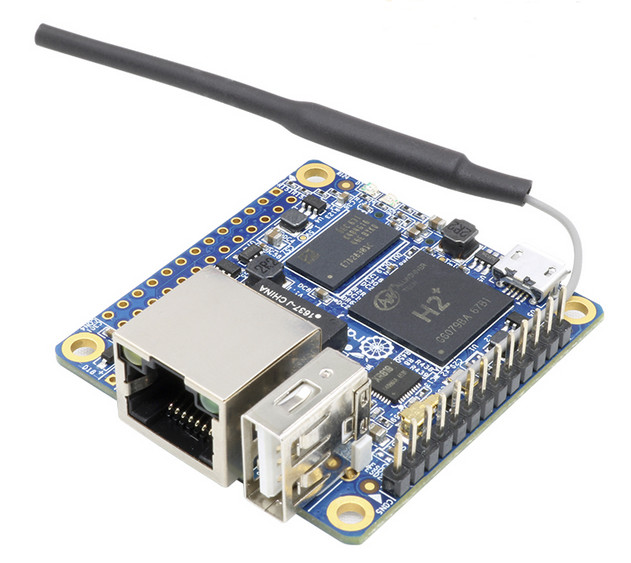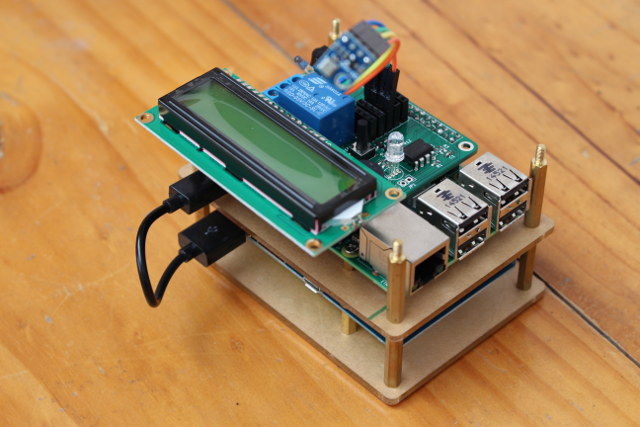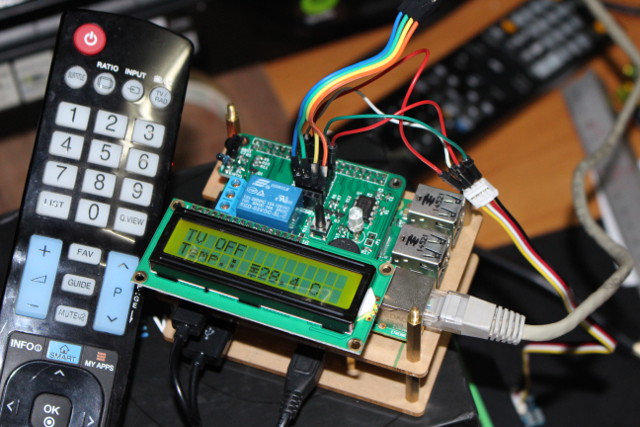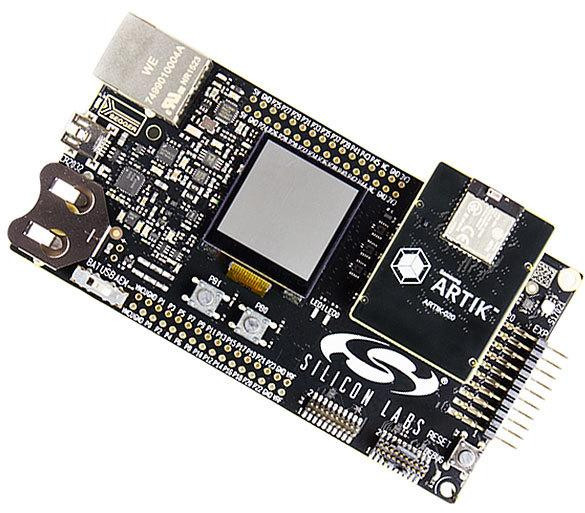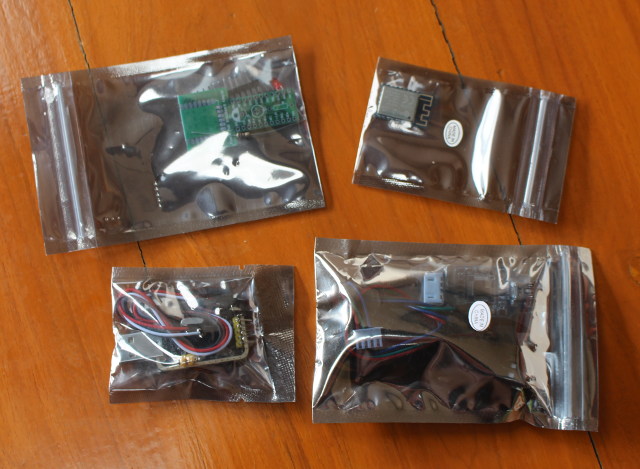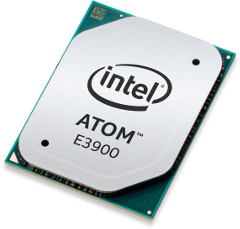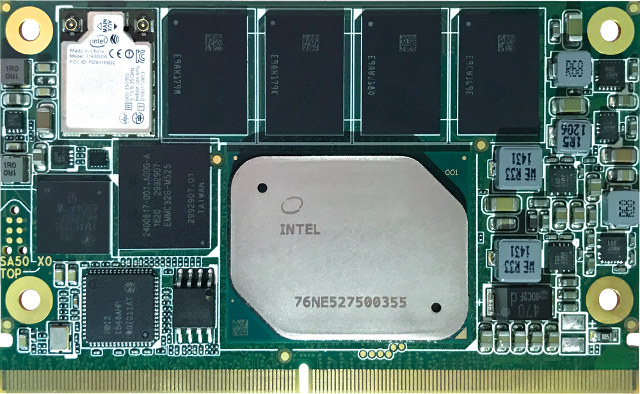Sonoff TH16 is a WiFi 16A relay that can take external sensors via a 2.5mm jack, while Sonoff Pow is a WiFi relay capable of measuring power consumption. Both have been designed by ITEAD Studio, and feature Espressif ESP8266 WiSoC. The company sent me both items for review, and I’ll start by checking out the hardware a little more closely than what is possible during the product announcement. I received Sonoff TH16 together with Sonoff AM2301 temperature and humidity sensor, which I’ll use to use to control an outdoor water pump and gather temperature and humidity data, as well as two Sonoff POW relays,which I plan to use to measure power consumption in my office, both from the power outlets and my aircon. All three WiFi relays support 3500 Watts, and 85 to 250V input. The packages have three QR codes for eWeLink iOS app, the Android app (coolkit.apk), and […]
Orange Pi Zero Allwinner H2+ Board with WiFi and Ethernet is Up for Sale for $7 and Up
Orange Pi Zero development board powered by Allwinner H2+ quad core Cortex A7 processor with 256 to 512MB RAM, Ethernet, and USB ports is now available for sale on Aliexpress for just $6.99, with shipping adding $3.39 in my case bringing the total to $10.38. Orange Pi Zero specifications: SoC – Allwinner H2(+) quad core Cortex A7 processor @ 1.2 GHz with Mali-400MP2 GPU @ 600 MHz System Memory – 256 to 512 MB DDR3-1866 SDRAM Storage – micro SD card slot Connectivity – 10/100M Ethernet + 802.11 b/g/n WiFi (Allwinner XR819 WiFi module) with u.FL antenna connector and external antenna USB – 1x USB 2.0 host ports, 1x micro USB OTG port Expansion headers – Unpopulated 26-pin “Raspberry Pi B+” header + 13-pin header with headphone, 2x USB 2.0, TV out, microphone and IR receiver signals Debugging – Unpopulated 3-pin header for serial console Misc – 2x LEDs Power […]
RabbitMax Flex IoT Board for Raspberry Pi Supporting up to Five I2C Sensors Launched on Indiegogo for 20 Euros and Up
RabbitMax Flex is an add-on board, compatible with HAT specifications, for Raspberry Pi 2 /3 boards and other Raspberry Pi models with a 40-pin GPIO header. It includes headers for up to 5 I2C sensors, as well as an RGB LED, a buzzer, a relay, a button, infrared receiver and transmitter, and an optional LCD display, and as we’ve seen in my RabbitMax Flex getting started guide, a nice way to learning about hardware programming using either C or Python, or to used in home automation or IoT projects. The project has just been launched on Indiegogo. RabbitMax Flex specifications: Relay – Songle SRD-05VDC-SL-C supporting 125V/250VAC up to 10A, 30VDC up to 10A Storage – EEPROM with some system information for identification IR – IR LED, IR receiver Misc – Buzzer, Button, RGB LED Expansion Header for LCD character display + potentiometer for backlight adjustment 5x 4-pin headers for I2C […]
Getting Started with RabbitMax Flex IoT and Automation Hat for Raspberry Pi
At the beginning of the month I showed how to assemble RabbitMax Flex, a Raspberry Pi HAT compliant add-on board for Raspberry Pi boards with 40-pin header, that targets IoT and home automation project with its relay, IR transmitter and receiver, I2C headers for sensors, buzzer, RGB LED, and more. Since I’ve already described the hardware, I’ve spend some time this week-end following the user’s guide to play around with the board using a Raspberry Pi 2 board, and try various features. The user’s manual explains that you need the latest version of Raspbian, but I’d not played with my Raspberry Pi 2 board for a while, so the kernel and firmware were quite old:
|
1 2 3 4 5 6 |
uname -a Linux raspberrypi 4.1.7-v7+ #817 SMP PREEMPT Sat Sep 19 15:32:00 BST 2015 armv7l GNU/Linux pi@raspberrypi ~ $ /opt/vc/bin/vcgencmd version Sep 23 2015 12:12:01 Copyright (c) 2012 Broadcom version c156d00b148c30a3ba28ec376c9c01e95a77d6d5 (clean) (release) |
So the first thing I had to do was to upgrade Raspbian. There are basically two options to upgrade, either downloading and dumping the latest Raspbian firmware image to your micro SD card, and […]
Samsung Introduces $5 ARTIK 0 and $50 ARTIK 7 Smart IoT Module Families
Samsung unveiled ARTIK 1, 3 and 5 boards for the Internet of Things in 2015, and started to sell them, together with development with WiFi, BLE and Zigbee connectivity earlier this year. The Korean company has now announced two new family with ARTIK 0 modules powered by an ARM Cortex-M MCU and destined to be used in HVAC, lighting, industrial sensors, personal health monitoring and more, as well as ARTIK 7 family powered by an Octa-core Cortex A53 processor, and targeting IoT gateways. ARTIK 0 Family ARTIK 0 family is now comprised for ARTIK 020 with Bluetooth, and ARTIK 030 for applications requiring Thread and/or Zigbee. Beside the different radios, both modules share the same key features: MCU – ARM Cortex-M4 up to 40 MHz with Floating Point Unit, 256KB flash, 32 KB SRAM, advanced hardware cryptographic engine with support for AES-128/-256, ECC, SHA-1, SHA-256, and a Random Number Generator […]
Pine64 PADI IoT Stamp WiFi IoT Kit Review – Part 1: Hardware, Debuggers, and Soldering
Back in September, Pine64 unveiled their $2 PADI IoT Stamp based on Realtek RTL8710 ARM Cortex M3 WiFi SoC aiming to compete with Expressif ESP8266 solutions. The company has now sent me their complete kit for review, which beside the module itself includes a breakout board kit, and some hardware debug tools. In the first part of the review, I’ll check out the hardware, and solder the kit. I received a package with four antistatic bags. From top left to bottom right, we have PADI IoT Stamp, JLINK-OB debugger based on an STM32 MCU with some jumper wires (aka Dupont cables) for SWD signals, and a USB cable to your computer in order to flash the firmware or do some bare metal programming, a breakout board kit including two headers, a RED LED, and a resistor, and finally a USB to Serial board based on CH340G with 4 jumper wires […]
Intel Introduces 3 Atom E3900 Apollo Lake Processors for IoT, Industrials and Automotive Applications: x5-E3930, x5-E3940, x7-E3950
Intel previously introduced Celeron and Pentium Apollo Lake processors for laptops and mini PCs, and it seemed Atom was gone for good from that processor family, but the vendor has now introduced Atom E3900 “Apollo Lake” processor family for IoT, industrial and automotive applications with three models: x5-E3930, x5-E3940, and x7-E3950. All three new processors will support up to 8 GB of LPDDR4/DDR3L memory, come in a FCBGA1296 package, be manufactured using 14 nm process, support 4K UHD video output up to 60 Hz on three independent displays, up to 15 simultaneous 1080p30 video stream, as well as 13MP cameras for photos and 1080p60 video capture. Peripherals interfaces include SATA 3.0, PCIe lane, HDMI, DisplayPort, embedded DisplayPort, USB 3.0 & 2.0 ports and more. The new processors also integrate Intel Time Coordinated Computing (TCC) Technology that “coordinates and synchronizes peripherals and networks of connected devices, achieving improved determinism. It can […]
Congatec Unveils conga-SA5 SMARC 2.0 Modules based on Intel “Apollo Lake” Atom x5/x7, Celeron and Pentium Processors
congatec, a company specialized in embedded computer modules, single board computers and embedded design and manufacturing services, has just introduced their conga-SA5 system-on-module family compliant with SMARC 2.0 specifications, and powered by the latest Intel Apollo Lake processors. conga-SA5 SoM’s specifications: SoC (one of the list) Intel Atom x7-E3950 quad core processor @ 1.6 / 2.0 GHz with 2MB L2 cache, 18 EU Intel Gen 9 HD Graphics (12W TDP) Intel Atom x5-E3940 quad core processor @ 1.6 / 1.8 GHz with 2MB L2 cache, 12 EU Intel Gen 9 HD Graphics (9W TDP) Intel Atom x5-E3930 dual core processor @ 1.3 / 1.8 GHz with 2MB L2 cache 1MB, 12 EU Intel Gen 9 HD Graphics (6.5W TDP) Intel Celeron N3350 dual core processor @ 1.1 / 2.4 GHz with 1MB L2 cache, 12 EU Intel Gen 9 HD Graphics (6W TDP) Intel Pentium N4200 quad core processor @ […]


